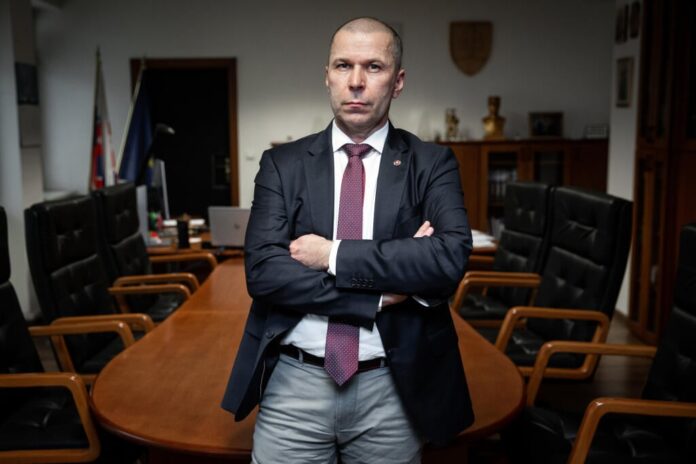The trial of Peter Kovařík, Slovakia’s former police president, reveals how political interests have infiltrated law enforcement, using state institutions to obstruct justice and shield corruption. Accused of halting a controversial police operation in 2021, Kovařík’s case highlights the “war of the police,” where entrenched political elites, including the Smer-SD party, have undermined anti-corruption efforts. With disbanded investigators, politicised prosecutions, and eroding public trust in the judiciary, the trial underscores a growing crisis in Slovakia’s democracy.
The trial of Peter Kovařík, Slovakia’s former police president, lays bare the devastating politicisation of law enforcement and its corrosive impact on democracy. Kovařík, accused of obstructing justice during his tenure in 2021, is at the centre of a power struggle that pits anti-corruption investigators against forces aligned with entrenched political interests. Dubbed the “war of the police,” this conflict reveals how political manipulation of state institutions undermines justice and erodes public trust.
Appointed in 2020 to lead reform efforts, Kovařík served during an aggressive anti-corruption drive by the National Criminal Agency (NAKA). The agency targeted powerful figures linked to the Smer-SD party, a political force accused of fostering a culture of corruption. These investigations provoked backlash from Smer-SD and its ally, Sme Rodina, who accused NAKA of fabricating cases. Publicly branding the investigators as the “Čurilla mafia,” they sought to discredit the agency and derail its work.
The trial highlights the controversial role of Team Oblúk, a police inspection unit led by investigator Diana Santusová, which claimed to investigate NAKA’s alleged misconduct. Instead, Oblúk allegedly acted as a tool for political retaliation, surveilling NAKA investigators and pressuring witnesses to reverse their testimonies. In July 2021, the team planned a high-profile operation to detain key witnesses cooperating with NAKA, prompting Kovařík to intervene. Arguing that the operation violated legal norms and posed a threat to ongoing investigations, he ordered it suspended.
Prosecutors accuse Kovařík of obstructing justice, claiming his actions shielded NAKA from scrutiny. His defence argues that he acted lawfully to prevent misuse of police powers. Regardless of the outcome, the trial exposes a judicial system in disarray. The inspection team’s actions, coupled with the General Prosecutor’s Office’s use of dubious legal provisions to dismiss cases, illustrate the weaponisation of law enforcement for political ends.
The stakes extend beyond Kovařík’s fate. Upon taking office, Interior Minister Matúš Šutaj Eštok disbanded NAKA, transferring its investigators to regional posts and crippling its anti-corruption efforts. While Eštok framed this as necessary reform, critics view it as a calculated move to neuter independent investigations and protect powerful interests. These actions, combined with the systematic discrediting of investigators, threaten the foundations of Slovakia’s democracy.
Kovařík’s trial is more than a legal proceeding; it is a referendum on the rule of law in Slovakia. The “war of the police” reveals how entrenched interests can hijack state institutions, turning them into instruments of political revenge. Restoring public confidence requires more than legal reforms—it demands an unflinching commitment to depoliticisation, accountability, and the preservation of democratic principles.
Source: Matúš Burčík | SME








